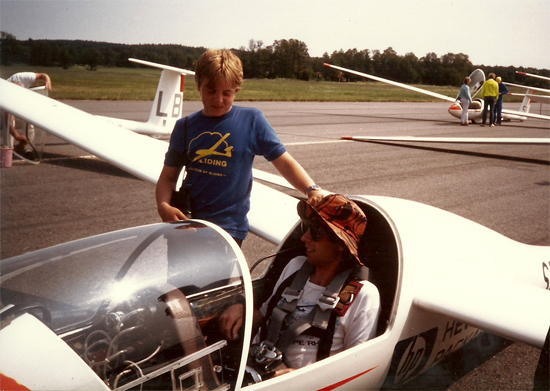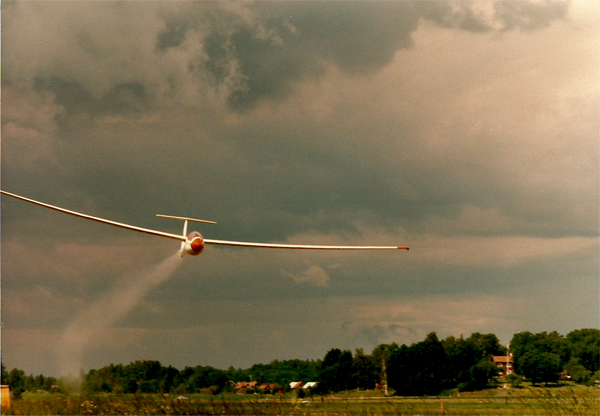 |
Home | Menu | Recent | Contact |
Over the Finnish forests. |
||||
 |
Back at the airfield we climb under a big cumulus, who could look better. Urban finds better climb than me and reaches the cloudbase while I struggle in a decreasing climb. Anyway, even I reach the cloudbase before the cloud collapses completly and can once again take a picture of the startclock at 14.13, ten minutes after Urban, altitude 1000 meter. Some new clouds has formed 10 km north of the airfield and I´m soon able to park the LS 4 in 1 m/s climb. Now it´s only a matter of staying in the air to be able to get on when new cumulus are forming under the areas where the overlaying clouds are a little thinner. And how about that, soon we see a new cumuluscloud in our way, and we can get 1100 m in a new 1 m/s thermal. We
are only 20 km out on the first leg, but now we have Hämeenlinna l5 km
ahead, and there is a big cumulus that looks really good. I reach it on
800 m and is immediatly rewarded with a 2 m/s climb all the way up to
1400 m. Only 25 km left to the first turningpoint, but not a shread of
cumulus on the way there and no flyable way from the turningpoint
either.
|
|||
|
- Good luck! With this whish not to have to drive out and fetch me, I get the responsibility for the LS 4 for the rest of the day. Up till now my exellent team (Sven-Olof Nilsson and Daniel Eckerström) has fixed everything on the plane, while I only had to concentrate on todays task, 302,8 km with three turningpoints. It´s the 5/6 1988, the third day of the European Soaring Championships in Reyskälä, Finland. I get airborn a little after one o´clock and the weather, that initially looked bad, gradually gets conciderably worse. The few small blue holes that has been in the sky are filled with grey clouds and the cumulus that was there are dissolving, one after another. If you should fly 300 km in such weather, you better not start to late, so the swedish pilot Urban Hansson and I start at the same time at 13.43. Many other standardclass pilots have thought the same and we all aim at two cumulus some 20 km out on the first leg. They are the only cumulus within reach, so the choice is simple. On the way out Urban and I glide side by side, and after passing the Russians we can state that Jantar Standard 3 doesn´t have much of a chance against LS 4 and Discus. But now we get a problem. Our dear cumulus, who we are all aiming at, are beginning to dissolve. We have two alternatives. Continue straight ahead towards a risk of an outlanding, or turn back to the airfield and try to restart later, but that may be to late. Urban and I turn back, but some pilots choose not to, and are later forced to land out. |
The
sun shines on the ground ahead of the turningpoint though, so Urban and
I glides, a kilometer apart, towards the sun. A number of other
standardclass planes are doing the same. They have started ahead of us,
so we have been faster so far. Urban and I hit a thermal at the same
time. I get better climb, so I call him in. What´s normally an
effective teamwork this time turns out to be a flop. Two hundred meters
below me there is no climb, so Urban quickly has to return to the
thermal he came from. Here we loose visual contact, and from now we can
only pass information trough the radio.
I reach the first turningpoint at 15.30, with an average speed of only 41 km/h. But the weather looks better now, and after returning to the same sunspotted area and climbing under newly formed cumulus, I go for the second leg. The first 60 km on the leg are caracterized by only two cumulus 30 km apart, but with reliable 2 m/s climbs below. After a new long glide I reach Lahti on 500 m, and here starts a beautiful cloudstreet straight towards the second turningpoint - unbelievable! - 2,5 m/s climb to 1400 m, then full speed. The sky has changed color from grey to blue and now there is no doubt we will finish the task. At 17.14 I reach the second turningpoint. It´s only 130 km left, and I can follow the same cloudstreet back to Lahti. Urban, who is going towards the turningpoint, reports good climb 20 km ahead of me. Full speed to there, and I can enjoy 3 m/s from 700 m to 1700 m. |
 |
From
here it´s one straight flight to Järvälä, the last turningpoint. Now
there are no cloudstreets anymore, only a few scattered cumulus, but
they look reliable. I take my pictures at 18.04. It´s only 65 km back
home, but the climbs have reduced to1 m/s and I climb to 1200 m
together with a Nimbus 3 in the open class. With his long wings he
slowly outclimbs me. 20 km further ahead I see the Nimbus circle once
again. A new 1 m/s to 1200 m. 35 km to the airfield, that´s enough!
I pass the finishline at 18.54 and end up 7:th for the day. Urban is back a few minutes later. He flew better that me on the last part of the track and almost cought me up. Anyhow it became his turn to by me a beer this day. ©
Mats Olsson
|
|||
| Passing the finishline at 250 km/h. Waterballast is dropped. |